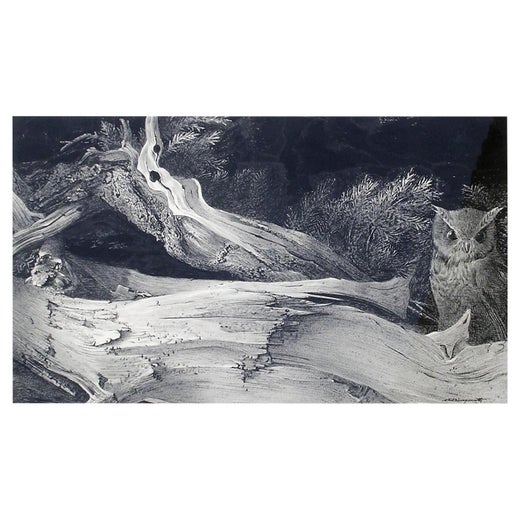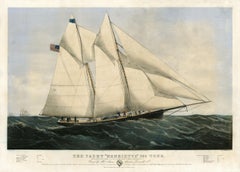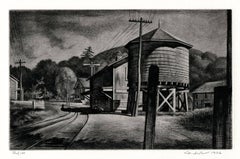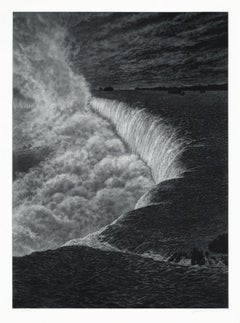Want more images or videos?
Request additional images or videos from the seller
1 of 9
Stow WengenrothLonely River.1953.
1953.
Price:$950
About the Item
- Creator:Stow Wengenroth (1906 - 1978, American)
- Creation Year:1953.
- Dimensions:Height: 22 in (55.88 cm)Width: 25 in (63.5 cm)Depth: 2 in (5.08 cm)
- Medium:
- Movement & Style:
- Period:
- Condition:Very good. Remains of old tape (stain) at paper edges - well outside of image. Small printing spot in the lower paper margin near the bottom left corner.
- Gallery Location:New York, NY
- Reference Number:Seller: #15620-21stDibs: LU33121786393
Stow Wengenroth
Born in Brooklyn in 1906, New York, Stow Wengenroth studied at the Art Students League of New York and Grand Central School of Art. He lived and worked for many years on Long Island and then moved to Rockport, Massachusetts. Wengenroth is renowned for his carefully wrought scenes of the New England seacoast like craggy rocks, lighthouses, boats and the sea. He died in 1978 in Rockport.
About the Seller
4.7
Recognized Seller
These prestigious sellers are industry leaders and represent the highest echelon for item quality and design.
Established in 1898
1stDibs seller since 2015
59 sales on 1stDibs
Typical response time: Several days
Associations
International Fine Print Dealers Association
Authenticity Guarantee
In the unlikely event there’s an issue with an item’s authenticity, contact us within 1 year for a full refund. DetailsMoney-Back Guarantee
If your item is not as described, is damaged in transit, or does not arrive, contact us within 7 days for a full refund. Details24-Hour Cancellation
You have a 24-hour grace period in which to reconsider your purchase, with no questions asked.Vetted Professional Sellers
Our world-class sellers must adhere to strict standards for service and quality, maintaining the integrity of our listings.Price-Match Guarantee
If you find that a seller listed the same item for a lower price elsewhere, we’ll match it.Trusted Global Delivery
Our best-in-class carrier network provides specialized shipping options worldwide, including custom delivery.You May Also Like
Le Leze IV, American Realist Lithograph by Ivan Theimer
By Ivan Theimer
Located in Long Island City, NY
Ivan Theimer, Czech (1944 - ) - Le Leze IV, Year: 1982, Medium: Lithograph, signed and numbered in pencil, Edition: 200, Size: 21 in. x 30 in. (53.34 cm x 76.2 cm)
Category
1980s American Realist Landscape Prints
Materials
Lithograph
Signed Mt. Lassen Vintage Lithograph by Richard Walter Dubois, Limited Edition
By Walter DuBois Richards
Located in Denver, CO
This striking vintage black-and-white lithograph by acclaimed artist Richard Walter Dubois vividly captures the dramatic landscape of Northern California’s Mt. Lassen. Featuring snow...
Category
Mid-20th Century American Realist Landscape Prints
Materials
Lithograph
Walter DuBois RichardsSigned Mt. Lassen Vintage Lithograph by Richard Walter Dubois, Limited Edition
$1,450
H 32.5 in W 25.25 in D 0.75 in
Nantucket North Wharf Night Sky Blue Sailboat Seaside Silkscreen Cottages Sea
By Donn Russell
Located in Nantucket, MA
Donn Russell made his own screen and did his own inking of the prints. He had no assistants and used no computers. He captured the beauty and charm of Nantucket and created images th...
Category
1970s American Realist Landscape Prints
Materials
Lithograph
$400
H 22 in W 29.25 in D 1 in
Hydrofoil, Photorealist Lithograph by Raymond Loewy
By Raymond Loewy
Located in Long Island City, NY
Artist: Raymond Loewy, American (1893 - 1986)
Title: Hydrofoil
Year: 1978
Medium: Lithograph, signed and numbered in pencil
Edition: 300
Image Size: 17 x 24 inches
Size: 21 in. x 28 ...
Category
1970s American Realist Figurative Prints
Materials
Lithograph
New England Coast (Greenport, New York)
By Stow Wengenroth
Located in Fairlawn, OH
New England Coast (Greenport, New York)
Lithograph, 1969
Signed in pencil lower right (see photo)
Edition: 350
Published in the book, Stow Wengenroth's New York, 1969
Limited slipcas...
Category
1960s American Realist Landscape Prints
Materials
Lithograph
Summer Shadows, Wiscasset, Maine
By Stow Wengenroth
Located in Fairlawn, OH
Summer Shadows, Wiscasset, Maine
Lithograph, 1947
Signed in pencil lower right (see photo)
"Ed. 85" lower left corner (see photo)
Edition: 85
Wiscasset, known as the "prettiest villa...
Category
1940s American Realist Landscape Prints
Materials
Lithograph
The Golden Gate
By Adolf Arthur Dehn
Located in Fairlawn, OH
The Golden Gate
Lithograph on wove paper watermarked GC, 1940
Signed in pencil by the artist (see photo)
Publisher: Associated American Artists
Edition: 189, unnumbered
The image depicts The Golden Gate Bridge which connects San Francisco and Marin County, California
References And Exhibitions:
Illustrated: Adams, The Sensuous Life of Adolf Dehn, Fig. 13.17, page 324
Reference: L & O 325
AAA Index 391
Adolf Dehn, American Watercolorist and Printmaker, 1895-1968
Adolf Dehn was an artist who achieved extraordinary artistic heights, but in a very particular artistic sphere—not so much in oil painting as in watercolor and lithography. Long recognized as a master by serious print collectors, he is gradually gaining recognition as a notable and influential figure in the overall history of American art.
In the 19th century, with the invention of the rotary press, which made possible enormous print runs, and the development of the popular, mass-market magazines, newspaper and magazine illustration developed into an artistic realm of its own, often surprisingly divorced from the world of museums and art exhibitions, and today remains surprisingly overlooked by most art historians. Dehn in many regards was an outgrowth of this world, although in an unusual way, since as a young man he produced most of his illustrative work not for popular magazines, such as The Saturday Evening Post, but rather for radical journals, such as The Masses or The Liberator, or artistic “little magazines” such as The Dial. This background established the foundation of his outlook, and led later to his unique and distinctive contribution to American graphic art.
If there’s a distinctive quality to his work, it was his skill in introducing unusual tonal and textural effects into his work, particularly in printmaking but also in watercolor. Jackson Pollock seems to have been one of many notable artists who were influenced by his techniques.
Early Years, 1895-1922
For an artist largely remembered for scenes of Vienna and Paris, Adolf Dehn’s background was a surprising one. Born in Waterville, Minnesota, on November 22, 1895, Dehn was the descendent of farmers who had emigrated from Germany and homesteaded in the region, initially in a one-room log cabin with a dirt floor. Adolf’s father, Arthur Clark Dehn, was a hunter and trapper who took pride that he had no boss but himself, and who had little use for art. Indeed, during Adolf’s boyhood the walls of his bedroom and the space under his bed were filled with the pelts of mink, muskrats and skunks that his father had killed, skinned and stretched on drying boards. It was Adolf’s mother, Emilie Haas Dehn, a faithful member of the German Lutheran Evangelical Church, who encouraged his interest in art, which became apparent early in childhood. Both parents were ardent socialists, and supporters of Eugene Debs. In many ways Dehn’s later artistic achievement was clearly a reaction against the grinding rural poverty of his childhood.
After graduating from high school in 1914 at the age of 19—an age not unusual in farming communities at the time, where school attendance was often irregular—Dehn attended the Minneapolis School of Art from 1914 to 1917, whose character followed strongly reflected that of its director, Munich-trained Robert Kohler, an artistic conservative but a social radical. There Dehn joined a group of students who went on to nationally significant careers, including Wanda Gag (later author of best-selling children’s books); John Flanagan (a sculptor notable for his use of direct carving) Harry Gottlieb (a notable social realist and member of the Woodstock Art Colony), Elizabeth Olds (a printmaker and administrator for the WPA), Arnold Blanch (landscape, still-life and figure painter, and member of the Woodstock group), Lucille Lunquist, later Lucille Blanch (also a gifted painter and founder of the Woodstock art colony), and Johan Egilrud (who stayed in Minneapolis and became a journalist and poet).
Adolf became particularly close to Wanda Gag (1893-1946), with whom he established an intense but platonic relationship. Two years older than he, Gag was the daughter of a Bohemian artist and decorator, Anton Gag, who had died in 1908. After her husband died, Wanda’s mother, Lizzi Gag, became a helpless invalid, so Wanda was entrusted with the task of raising and financially supporting her six younger siblings. This endowed her with toughness and an independent streak, but nonetheless, when she met Dehn, Wanda was Victorian and conventional in her artistic taste and social values. Dehn was more socially radical, and introduced her to radical ideas about politics and free love, as well as to socialist publications such as The Masses and The Appeal to Reason.
Never very interested in oil painting, in Minneapolis Dehn focused on caricature and illustration--often of a humorous or politically radical character. In 1917 both Dehn and Wanda won scholarships to attend the Art Students League, and consequently, in the fall of that year both moved to New York. Dehn’s art education, however, ended in the summer of 1918, shortly after the United States entered World War I, when he was drafted to serve in the U. S. Army. Unwilling to fight, he applied for status as a conscientious objector, but was first imprisoned, then segregated in semi-imprisonment with other Pacifists, until the war ended. The abuse he suffered at this time may well explain his later withdrawal from taking political stands or making art of an overtly political nature. After his release from the army, Dehn returned to New York where he fell under the spell of the radical cartoonist Boardman Robinson and produced his first lithographs. He also finally consummated his sexual relationship with Wanda Gag.
The Years in Europe: 1922-1929
In September of 1921, however, he abruptly departed for Europe, arriving in Paris and then moving on to Vienna. There in the winter of 1922 he fell in love with a Russian dancer, Mura Zipperovitch, ending his seven-year relationship with Wanda Gag. He and Mura were married in 1926. It was also in Vienna that he produced his first notable artistic work.
Influenced by European artists such as Jules Pascin and Georg Grosz, Dehn began producing drawings of people in cafes, streets, and parks, which while mostly executed in his studio, were based on spontaneous life studies and have an expressive, sometimes almost childishly wandering quality of line. The mixture of sophistication and naiveté in these drawings was new to American audiences, as was the raciness of their subject matter, which often featured pleasure-seekers, prostitutes or scenes of sexual dalliance, presented with a strong element of caricature. Some of these drawings contain an element of social criticism, reminiscent of that found in the work of George Grosz, although Dehn’s work tended to focus on humorous commentary rather than savagely attacking his subjects or making a partisan political statement. Many Americans, including some who had originally been supporters of Dehn such as Boardman Robinson, were shocked by these European drawings, although George Grocz (who became a friend of the artist in this period) admired them, and recognized that Dehn could also bring a new vision to America subject matter. As he told Dehn: “You will do things in America which haven’t been done, which need to be done, which only you can do—as far at least as I know America.”
A key factor in Dehn’s artistic evolution at this time was his association with Scofield Thayer...
Category
1940s American Realist Landscape Prints
Materials
Lithograph
Hidden Pond
By Stow Wengenroth
Located in Fairlawn, OH
Hidden Pond
Lithograph, 1958
Signed in pencil lower right of image
Annotated: Ed/40 in pencil by the artist lower left
Edition: 40
Provenance:
Baldwin-Wallace College, Berea, OH (acc...
Category
1950s American Realist Landscape Prints
Materials
Lithograph
City Park, Winter
By Aaron Bohrod
Located in Fairlawn, OH
City Park, Winter
Lithograph, c. 1947
Signed in pencil lower right (see photo)
Published by Associated American Artists
Printed by George C. Miller, New York
Edition: c. 250
In the Bohrod papers at Syracuse University, the artist states that it is a view of Pittsburgh. It depicts the George Washington Monument in Allegheny Commons Park, dedicated in 1891. The sculptor f the monument is Edward Ludwig Albert Pausch (1856-1931).
Condition: Excellent
Image size: 9 1/4 x 13 7/16 inches
Frame size: 19 x 23 inches
Provenance: Estate of Adolf Dehn
Reference: AAA Index No. 848
Aaron Bohrod (21 November 1907 – 3 April 1992) was an American artist best known for his trompe-l'œil still-life paintings.
Education
Bohrod was born in Chicago in 1907, the son of an emigree Bessarabian-Jewish grocer. Bohrod studied at the School of the Art Institute of Chicago and the Art Students League of New York between 1926 and 1930. While at the Art Students League, Bohrod was influenced by John Sloan and chose themes that involved his own surroundings.
Career
He returned to Chicago in 1930 where he painted views of the city and its working class. He eventually earned Guggenheim Fellowships which permitted him to travel throughout the country, painting and recording the American scene. His early work won him widespread praise as an important social realist and regional painter and printmaker and his work was marketed through Associated American Artists in New York. Bohrod completed three commissioned murals for the Treasury Departments Section of Fine Arts in Illinois; Vandalia in 1935, Galesburg in 1938 and Clinton in 1939. During World War II, Bohrod worked as an artist; first in the Pacific for the United States Army Corps of Engineers' Army War Art Unit...
Category
1940s American Realist Landscape Prints
Materials
Lithograph
Backyard II
By Robert Kipniss
Located in Fairlawn, OH
Backyard II
Lithograph, 1972
Signed lower right
Signed lower right
Annotated: Printer's Proof
Reference: Karl Lunde 58
An impression is in the collection of the Art Institute of Chic...
Category
1970s American Realist Landscape Prints
Materials
Lithograph
More From This Seller
View AllUnion Pond, Williamsburgh, L. I. [sic].
By Winslow Homer
Located in New York, NY
UNION POND, WILLIAMSBURGH, L. I. [sic] is a lithograph printed in color in circa 1862. It was published by Thomas & Eno, 37 Park Row, N.Y. The printed image size is 16 3/4 x 27 in...
Category
1860s American Realist Landscape Prints
Materials
Lithograph
The Yacht "Henrietta" 205 Tons. Modelled by Mr. Wm. Tooker, N.Y. Built by Mr. ..
By Charles Parsons
Located in New York, NY
Title continues: Built by Mr. Henry Steers, Greenpoint, L. I. Owned by Mr. James Gordon Bennett, Jr. Winner of the Great Ocean Yacht Race, With the ...
Category
1860s American Realist Landscape Prints
Materials
Lithograph
West Cornwall Station.
By Armin Landeck
Located in New York, NY
Armin Landeck created this 1936 drypoint was printed in an edition of 100. The image size is 6 7/8 x 10 7/8" and the paper size 12 1/2 x 16". It is Signed and dated in the...
Category
Mid-20th Century American Realist Landscape Prints
Materials
Drypoint
Niagara
By Frederick Mershimer
Located in New York, NY
NIAGARA
Contemporary artist Frederick Mershimer created the mezzotint engraving entitled “Niagara” in 2021. This impression is signed, titled, dated, and inscribed “5/45”- the 5th ...
Category
21st Century and Contemporary American Realist Landscape Prints
Materials
Mezzotint
Crossings
By Frederick Mershimer
Located in New York, NY
CROSSINGS
Contemporary artist Frederick Mershimer created the mezzotint engraving entitled "Crossings" in 1998. This impression is signed, titled, and dated in pencil. The printed ...
Category
Late 20th Century American Realist Landscape Prints
Materials
Mezzotint
Benches. [Central Park.]
By Harold Altman
Located in New York, NY
Signed, titled, and dated in pencil. Inscribed "21/285.." Edition 285. Very good condition.
Category
1980s Realist Landscape Prints
Materials
Lithograph

![Union Pond, Williamsburgh, L. I. [sic].](https://a.1stdibscdn.com/winslow-homer-prints-works-on-paper-union-pond-williamsburgh-l-i-sic-for-sale/a_3312/1595513020620/Homer_Union_Pond_frame_IMG_8498_master.jpg?width=240)


